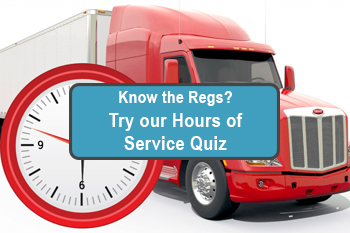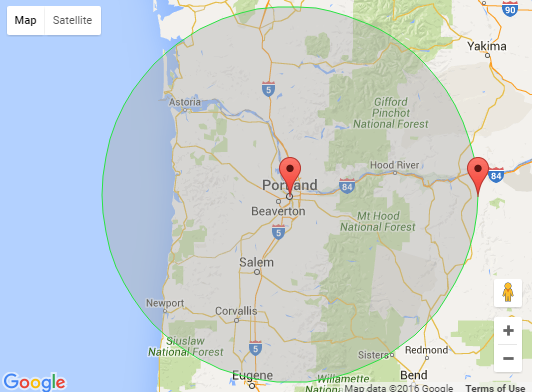Hours of Service: The 100 and 150 Air Mile Short Haul Exemption
With the Electronic Logging Device (ELD) rule mandating many carriers to have an ELD to record hours of service (HOS) and performance, questions have risen as to what kind of carriers and drivers are subject to this rule.
The most common exemption to the new ELD mandate applies to carriers who operate within a 100 to 150 air mile radius of their headquarters.
Basically, if a carrier qualifies for the short haul exemption, then the carrier is not required to daily record their drivers with grid-style logs (record of duty status or RODs), although the motor carrier must keep daily time records (timecard) of the times the drivers report for and are released from work each day, and the total hours on duty each day.
So, does your company qualify for the short haul exemption?
What is an Air Mile?
Before answering this, we need to understand what an air mile actually is. An “air mile” is basically the distance in a straight line between two points. So, if your headquarters is located at Point A, an air mile is the distance you would travel in a straight line to your destination – Point B. You can use Google Maps to experiment with drawing radii from your office to determine air mile distances. See example for reference.
Who Qualifies for the 100 and 150 Air Mile Exemption?
The 100 air mile exemption is for CDL drivers. This is typically drivers of dump trucks, log trucks, or delivery drivers with commercial vehicles over 26,000 lbs, who:
- Operate within 100 air miles of their daily starting location
- Go off duty within 12 hours
- Report back to the same work location every day
- Have at least 10 consecutive hours off before starting their next on-duty period
The 150 air mile exemption is for non-CDL commercial drivers. This is typically drivers of a light and medium-weight commercial vehicle (10,001 to 26,000 lbs) commonly used by smaller local moving companies, or smaller construction vehicles, who:
- Operate within 150 air miles
- Do not drive through any state that requires a CDL for the type of vehicle being driven
- Report back to the same work location every day
- Do not drive after the 14th hour of coming on duty in a period of seven consecutive days
However, if a driver goes beyond their air mile radius more than eight (8) times in a 30 day rolling time frame, the exemption does not apply anymore. This means the carriers needs to track this driver's record of duty status with a daily log, instead of a timecard, and would then be required to have an ELD in that driver's truck.
If your company meets all of these requirements... then no daily paper or ELD logs (record of duty status) are needed, except for a paper grid-style log for those few days you do go beyond the short-haul limit. Again, motor carriers still need to have a daily timecard for these drivers during normal days.
What are you Exempt From?
Certain hours of service rules apply no matter what. For example, drivers are never allowed to drive more than 11 hours, nor are they allowed to drive after having been on duty for 14 hours.
 Although air-mile exempt drivers are not required to maintain a daily detailed log of their duty status, they are required to record their on-duty time. Drivers who qualify for these exemptions must maintain a record of:
Although air-mile exempt drivers are not required to maintain a daily detailed log of their duty status, they are required to record their on-duty time. Drivers who qualify for these exemptions must maintain a record of:
- The time they go on duty
- The total number of hours they are on duty
- The time they go off duty
It is important to understand that ALL of the qualifications listed above must be met in order to use the exemption. If a situation arises that nullifies even one of the qualifications, then all of the standard hours of service rules apply.
Electronic Logging Device (ELD) Mandate Exemptions
Anybody who qualifies for the 100 and 150 air mile exemption is exempt from daily RODs, which means they are also exempt from the ELD mandate.
As with all Federal Motor Carrier Safety Regulations, it is important to familiarize yourself with the hours-of-service requirements. It may seem like an unnecessary hassle for companies that don’t travel long distances, but should a FMCSA auditor find you out of compliance with any of the hours of service rules, the hassle that may ensue could be far more severe.
It is best practice, even if you happen to drive beyond the air-mile radius one day more that the exemptions allows once a year, to have an ELD in that truck. The cost of potential fines during an audit with a strict auditor could cost you thousands of dollars and the benefits of the data an ELD can gather could be even more beneficial to your company and driver.
If you have any questions, reach out to the expert Glostone staff at 503-607-1088.
Want even more information on exemptions affecting short-haulers, be sure to check out our one hour webinar:
Not sure if you're subject to the ELD Mandate? Let our staff help you find out.

